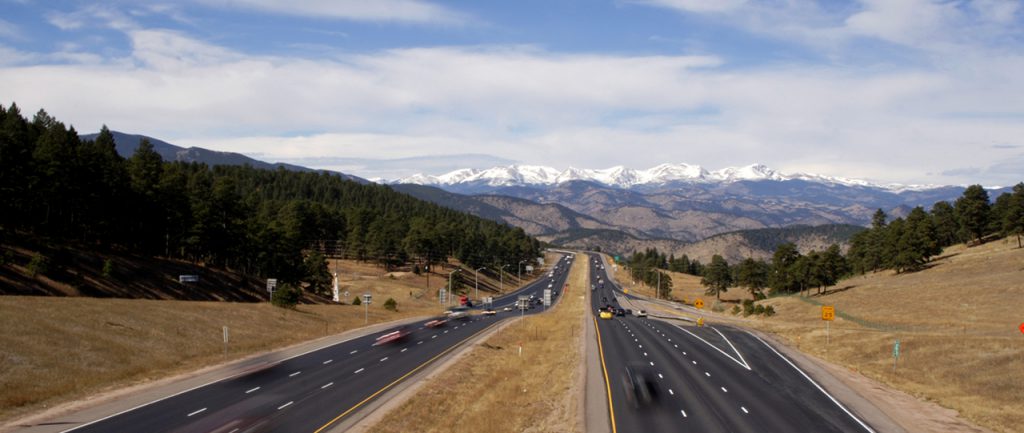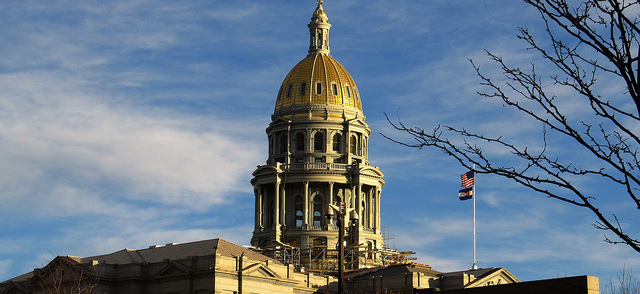UPDATE: On Friday, the last day to file any other titles for the November ballot, the coalition filed a fifth ballot title to provide another option to address state and local transportation priorities that would increase sales tax 0.35 percent.
On Feb. 22, we joined with a large coalition of partners from across the state to file language for a November ballot issue asking Coloradans to invest in our transportation infrastructure through an increase in sales tax. The coalition submitted four proposals to increase the state’s sales tax and allow us to bond so the large projects on the Colorado Department of Transportation's (CDOT) priority project list can be accomplished. The sales tax increases include 0.5 percent, 0.62 percent and 1 percent, which amounts to just five to 10 cents on a $10 purchase. The fourth proposal includes a 0.5 percent sales tax increase and requires the state to transfer $150 million from current general fund revenues each year to fund state and local transportation projects. The fifth proposal, filed Friday, would increase sales tax .35 percent for local and multimodal projects, dividing revenue among cities (who would receive 40 percent), counties (40 percent) and multimodal projects (20 percent) – raising $432 million in the first year. It would also bond up to $3.7 billion for state highway projects, relying on funds dedicated by the legislature.
Former Centennial Mayor Cathy Noon and Summit County Commissioner Dan Gibbs filed the first four initiatives on behalf of the coalition with the intention to move one of them forward onto the November ballot after we know the level of commitment we are able to get from current revenues. This approach ensures we are only asking voters for what is absolutely necessary to address our most critical transportation needs.
Why? We have critical needs that have gone unmet for decades. In fact, it’s been almost 25 years since our state has received an increase in tax revenue for transportation. During that same period, Colorado’s population has grown by almost 2 million people and technology is delivering mobility solutions that we aren’t able to take advantage of.
Our failure to invest is costing us real money. Colorado drivers are, on average, paying more than $1,600 a year because of traffic congestion delays, damage to vehicles, accidents and lost gas efficiency. Those costs really add up — in total, Coloradans are paying $6.8 billion annually due to the poor condition of our transportation system.
The solution is as clear as it is hard. We must invest in our transportation system. The coalition has identified critical elements to meet our needs:
- Focus on a statewide approach to ensure our economic engine of the Front Range and the quality of life delivered by our mountains and plains can be maintained.
- Allocate funding to address the large, high-priority statewide projects like I-70 and I-25.
- Ensure local governments (cities and counties) have the resources to meet their needs. Many of us don’t know whether we’re driving on a state highway or a local road — both need to be addressed.
- Encourage regions to continue to work together to find solutions that allow regional issues to be addressed based on local priorities. Such solutions can include bus or van services that allow seniors to get to doctor appointments, improvements for pedestrians or roadway connections.
There are a number of reasons the coalition is focusing on sales tax over other options:
- Gas tax is diminishing over time as cars get more efficient and electric and hybrid vehicles don’t pay their fair share.
- A small increase in sales tax raises more revenue than very large increases in vehicle registration or gas tax.
- Unlike a vehicle registration tax, sales tax ensures that those 84 million visitors to Colorado contribute to maintaining and improving our roads.
- Local governments rely heavily on sales tax, and a significant portion of the money raised will go straight to supporting local priorities.
We know this approach isn’t the easy road — outside of sin taxes, Coloradans haven’t raised taxes since approval of TABOR (the Taxpayer’s Bill of Rights) in 1992. But the demand for transportation investment has reached a critical level. Voters have shown us in the past that they will make these investments locally and regionally when there’s a clear plan to solve a challenge we face. We look forward to making that happen on a statewide level.
Want to stay engaged on this and other policy issues?



